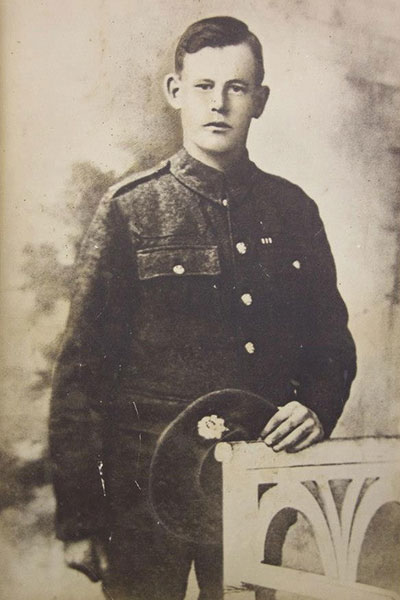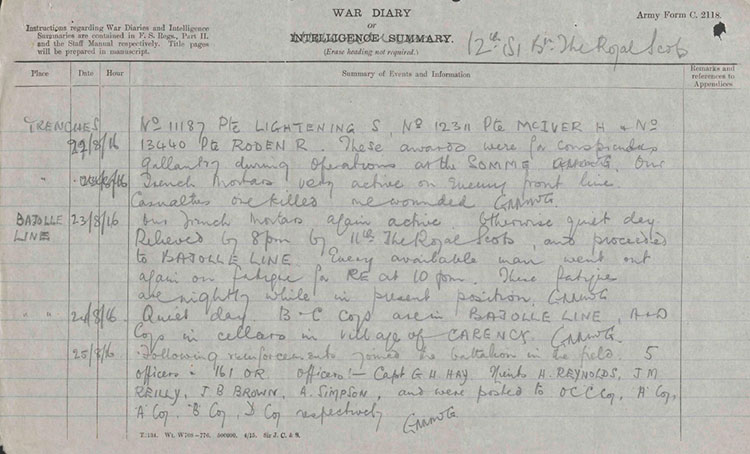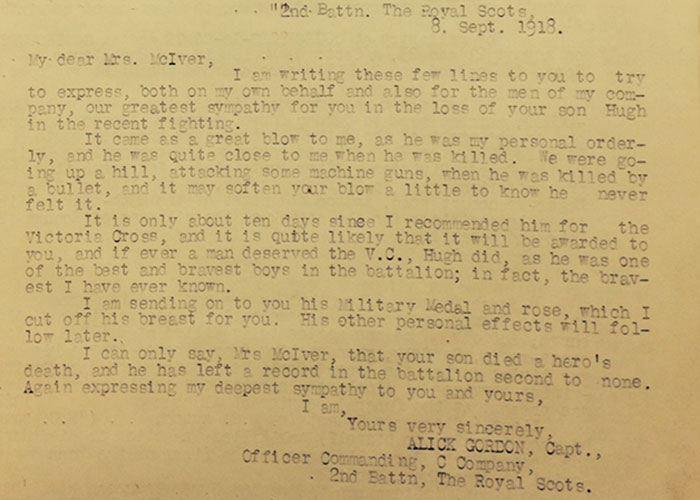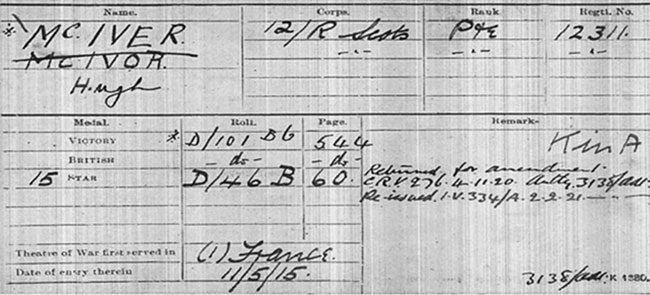The story of Private Hugh McIver VC MM and Bar
Last month my blog recorded the early history of My Tommy, Private Hugh McIver, and how he spent over two years abroad with 12th Battalion Royal Scots, before suffering shrapnel wounds to his leg and returning home in October 1917. Later, his service record, held in series WO 363, confirms that, via the Scottish Command Depot and the 3rd Battalion, Private McIver disembarked for France once more as part of the 2nd Battalion Royal Scots on 12 February 1918.
The two relevant War Diaries (that cover the period Hugh served abroad with the 2nd Battalion Royal Scots) are in WO 95/1423/5 and WO 95/1423/6. Both are held by The National Archives and you can view them online. Through these day-to-day recordings of the work carried out by the battalion, one can get a real understanding of the conditions and overall experience of men in the trenches during the First World War.
It is interesting to note that, while battles and enemy engagements are written up in detail, some entries are short and succinct stating simply ‘situation quiet’, ‘enemy quiet’ and ‘nothing special to report’. These records suggest that even amidst the chaos of the First World War there are some days where men only had the excitement of a ‘kit inspection’ or a ‘drill’ to fill their time. We can only imagine whether these quieter days were considered a treasured commodity amongst the men or if the thick of the action was easier to deal with than the calm before the storm. On 15 July 1918 an entry in the War Diary states that ‘daylight patrols were successful in capturing four of the enemy. This patrol consisted of 4 other ranks under 2/Lieut HM Somerville’.
Just 12 days later, an entry in the battalion War Diary informs us that ‘the following awards were granted for “daring” and initiative during daylight patrols in the enemy lines on 15th July…’. One of the awards was a ‘Bar to Military Medal…[for]Private H McIver (12311) MM of “C” Coy 2nd Battalion Royal Scots’.
The man who we learned last month was once considered ‘unlikely to become an efficient special reservist’ had just been awarded his second decoration for bravery. The Bar to Hugh’s Military Medal appeared in the London Gazette on 21 October 1918 (past issues of The Gazette are fully searchable online), however Hugh had died over a month previously and his entry reads ‘No. 12311 Private Hugh McIver, M.M., late R. Scots (Newton)’.
One month later the 2nd Battalion Royal Scots were involved in a significant attack at Courcelles-le-Comte that started on 21 August 1918, and severe fighting with the enemy continued until 25 August when the men are recorded as ‘resting and clearing up’.
The Victoria Cross
Following his death in action on 2 September 1918, Private Hugh McIver (12311) of ‘C’ Coy, 2nd Battalion Royal Scots would be gazetted for the Victoria Cross for his part in the action at Courcelles-le-Comte. The reason for the Award of the VC appears in the 2nd Battalion War Diary on 19 November 1918. The entry states:
The General Officer Commanding has great pleasure in announcing that HIS MAJESTY THE KING has awarded the VICTORIA CROSS to the undermentioned soldiers for gallantry in the field.
No 12311 Private H. McIver MM “C” Coy (since Killed in Action)
During Operations on the morning of the 23rd August 1918 Private McIver while company runner behaved in the most gallant manner. On one occasion he pursued a German for 150 yards. The Germans took refuge in a machine gun nest, Private McIver at once without the slightest regard for his own personal safety jumped into the trench, bayoneted and shot about six of the occupants, the remainder numbering about twenty with two machine guns at once surrendered. Through this man’s brave action the Company was enabled to advance to their objective. He also carried important messages continuously through extremely heavy artillery and machine gun fire.
The exact citation from the London Gazette, dated 15 November 1918, indicates that in addition, Hugh ‘succeeded at great personal risk in stopping the fire of a British Tank which was directed in error against our own troops at close range. By this very gallant action Private McIver undoubtedly saved many lives’.
Nine days after Hugh was involved in the above act of gallantry he was killed in action on 2 September 1918 during an attack near the village of Noreuil. The War Diary indicates that Private McIver’s company were further advancing up a trench when they were ‘held up by m[achine] g[un] fire’. Iit is at this time that it appears Hugh was killed. The document further notes that two Lieutenants and 24 other ranks of the Royal Scots were also killed on 2 September, while a further six men were recorded as missing.
A letter to a grieving mother
The National Army Museum (NAM) holds individual books known as the Lummis VC Files (accession number NAM-1974-07-83) containing information and press cuttings relating to recipients of the Victoria Cross who served in the British Army. Contact the Museum’s Templer Study Centre to arrange to view these files. In Private Hugh McIver’s book there is a record of the letter sent from Captain Alick Gordon, the Officer Commanding of ‘C’ Company 2nd Battalion Royal Scots, to my great-great grandmother Mary, following his death on 2 September. The detail and emotion of the letter inspired me to include it here in full:
My dear Mrs. McIver,
I am writing these few lines to you to try to express, both on my own behalf and also for the men of my company, our greatest sympathy in the loss of your son Hugh in the recent fighting.
It came as a great blow to me, as he was my personal orderly, and was quite close to me when he was killed. We were going up a hill, attacking some machine guns, when he was killed by a bullet, and it may soften your blow a little to know he never felt it.
It is only about ten days since I recommended him for the Victoria Cross, and it is quite likely that it will be awarded to you, and if ever a man deserved the V.C. Hugh did, as he was one of the best and bravest boys in the battalion; in fact, the bravest I have ever known.
I am sending on to you his Military Medal and rose, which I cut off his breast for you. His other personal effects will follow later.
I can only say Mrs McIver, that your son died a hero’s death, and he has left a record in the battalion second to none.
As a member of the British Army who died during the First World War, Hugh appears in the commemorative records of the Commonwealth War Graves Commission (CWGC). The original burial and cemetery documents have recently been digitised and published on the Commission’s website and are available to view online. Hugh is recorded as being buried in Plot 1, Row A, Grave 19 of Vraucourt Copse Cemetery in Vaulx-Vraucourt, France. The surviving records indicate that my Great-great Grandmother chose a simple inscription for her son’s grave: ‘Rest in Peace’.
The Lummis File for Private McIver contained a reference to my great-great grandfather and grandmother venturing from Scotland to Buckingham Palace on 13 February 1919, in order to receive their late son’s Victoria Cross from King George V. My great-great grandfather would die in a pit-accident back in Newton just over a month later, bringing into sharp focus the reality of my family’s story. Hugh McIver came from a poor background and was destined to a life, and possible death, down the mines – just like his father. The First World War created the extraordinary conditions that led to men like Hugh being responsible for the most incredible acts of bravery in horrendous conditions. Under the shadow of a terrible war and the death of their son, for one day and one day only, Hugh’s actions brought his parents from Newton Pit to Buckingham Palace.
I mentioned in my blog last month that my family have been very fortunate regarding the variety of surviving records relating to Private McIver in the various collections held by The National Archives, and other institutions such as the NAM and the CWGC. Being related to a Victoria Cross winner is unique in a further sense as the legacy of VC recipients from the First World War has been actively celebrated by local communities both in the United Kingdom and beyond. For example, the story of Private McIver’s Victoria Cross appeared on the front cover of 18 November 1972 edition of the popular Scottish comic, The Victor, published by DC Thompson. I am particularly fond of the extract from the comic where Hugh encounters a German soldier who describes him as an ‘Englander’ to which the fresh faced soldier retorts ‘I’m no an Englander – I’m a Scot!’. A flight of fancy no doubt, but it is interesting to see the image of the martial Scotsman as a unique form of cultural identity.
Additionally, in 2008, to commemorate the 90th anniversary of the act that led to Hugh being posthumously awarded the VC, the Mayor of Courcelles-le-Comte, in association with the Somme Remembrance Association, unveiled a memorial to him and his act of courage at a ceremony involving local officials from Paisley, soldiers of the 1st Battalion Royal Regiment of Scotland, and over 50 members of Hugh’s family – myself included. It was a typically warm and pleasant summer’s day in the French countryside, yet the injection of kilts, bagpipes and Scottish soldiers meant that nearly 90 years after his death, Courcelles-le-Comte belonged to Hugh.
Mistakes in original records
It can be seen quite clearly that Hugh’s legacy has survived in the form of many records and contemporary acts of remembrance. However, from a research perspective, and as someone who frequently uses military sources from the First World War, it never surprises me to see the mistakes which feature in original records relating to military personnel.
Private Hugh McIver is no different as his medal card (WO 372/13/13894), held by The National Archives in the collection of First World War Medal Index Cards [ref] The First World War Medal Index Cards are available to download from The National Archives’ website [/ref] states that his name was originally misspelled as ‘McIvor’ when recording his entitlement to his campaign medals. Any research into our relatives who served in the First World War should always be undertaken with spelling mistakes, inaccurate service numbers and inconsistencies in mind, to ensure we can navigate around the inevitable administrative errors that may have occurred, due to the limitations of the period and pressures of the time.
‘I will never forget’
Private Hugh McIver VC MM and Bar was born and raised in a large working class Scottish family. And like many others during the First World War, he died a soldier’s death in a foreign field. His journey from a young man deemed ‘not likely to become an efficient special reservist’ to the ‘bravest’ man his Captain had ever known is a truly incredible one. To be awarded medals for acts of gallantry on three separate occasions is an aspect of Hugh’s story that I believe makes him stand out. That one of these awards was the Victoria Cross further ensures he remains part of a very small group of decorated British soldiers. The evidence analysed in my blog last month indicates that Hugh was no angel, but the extracts from this blog may explain why ‘My Tommy’ is a legend in the eyes of my family.
The Clan motto assigned to the surname McIver is ‘I will never forget’. As my great-great Uncle Hugh rests in peace, it is certain that his family will never forget him.




Dear James Fleming
I would like to say how inspirational the story of Private Hugh McIver is. Your research and attention to detail is commendable. Leaving no detail to chance. I was astonished to read Mrs McIver lost her husband in a pit disaster one month after returning from Buckingham Palace and there presentation to the King. The sorrow Mrs McIver and other women had to endure is immeasurable at this time. Your writing of Hugh McIver your ancestor are poignant and so well documented by yourself. You are to be commended for all your research and sharing of details to let the public who live in Mr McIver’s home town search for more details of his amazing story and could perhaps research the lives and times of there own relations..
Remarkable work completed by you James Fleming your family who are so proud of Private McIver must also be so proud of you James for the research and written memory you have given to everyone. Very well done James. Isabella Macdonald
[…] My Tommy’s War: From the pits to the palace (part 2) […]
Dear James,
A really well written account of a very brave young man,one of many.
After reading the first part I looked forward to the second part knowing the ending,but at the same time not knowing the details.I must admit each little story was very emotional.I especially liked the fact that The Victor printed a recognition, and your skill in writing the phrase – Courcelles-le-Comte belonged to Hugh – was brilliant. Obviously a joy to write and certainly a joy to read. Thank you.
Remarkable man exceptional circumstances and humbling to know he was one of too many who gave their lives. This well written and personal account left me proud to be scottish and appreciative of our armed forces of then and now.
I am really pleased to have found this blog James and to have learned a few things about Great Uncle Hugh that I had no previous knowledge of. Hugh was the brother of my grandmother Jane McIver and we grew up with his picture hanging in our home and always knew the story of his brave actions for which he was awarded the VC. I remember seeing the medal as a small child.
I was always inspired by his story and made my mind up at an early age to join the Army. I spent most of my adult life as a soldier having served 22 years and retired from the Army in 2007. I took my family to visit Hugh’s grave in 2008 while visiting friends who live not too far from the area. It was quite emotional and something that I had always wanted to do since a young age.
I only came across this blog because a friend of mine is visiting Edinburgh for the Bank Holiday weekend with her family and will be visiting the castle. I suggested she visit the Royal Scots museum and try to look up Hugh’s story while she is there and it was while looking for some information for her that I came across this page. So thank you for helping to educate me on Hugh’s earlier life and giving a bit of an insight into his character.
Good luck, Frank McGuinness
Hi James, after reading parts 1/2 although I knew some of Hughes life you have done him proud , enjoyed reading it and things that we didn’t know thank you for sharing it with us